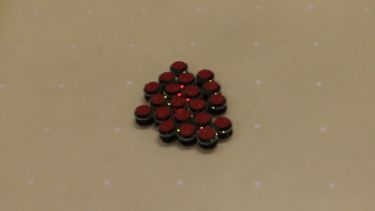Evolving aggregation behaviours in multi-robot systems with binary sensors
M Gauci, J Chen, T J Dodd and R Groß.

This paper investigates a non-traditional sensing trade-off in swarm robotic. Each robot has a relatively long sensing range, but processes a minimal amount of information.
Aggregation is used as a case study, where randomly placed robots are required to meet at a common location without using environmental cues. The binary sensor used only lets a robot know whether or not there is another robot in its direct line of sight.
Simulation results with both a memoryless controller (reactive) and a controller with memory (recurrent) prove that this sensor is enough to achieve error-free aggregation. This is as long as a sufficient sensing range is provided.
The recurrent controller gave better results in simulation. A post-evaluation shows that it is able to aggregate at least 1000 robots into a single cluster consistently. Simulation results also show that, with the recurrent controller, false negative noise on the sensor can speed up the aggregation process.
The system has been implemented on 20 physical e-puck robots, and systematic experiments have been performed with both controllers. On average, 86-89% of the robots aggregated into a single cluster within ten minutes.
Supplementary material
The additional analyses (PDF, 308KB) referred to are contained in a PDF document.
Videos of all the 60 trials performed with 20 physical e-puck robots are available on YouTube. These videos were recorded with an overhead camera and are in real speed.
Gauci, M., Chen, J., Dodd, T. J. and Groß, R. Evolving Aggregation Behaviors in Multi-Robot Systems with Binary Sensors. Proc. of the 2012 Int. Symp. on Distributed Autonomous Robotic Systems (DARS). Springer-Verlag, Berlin/Heidelbeg, 2013. In press (14 pages).
